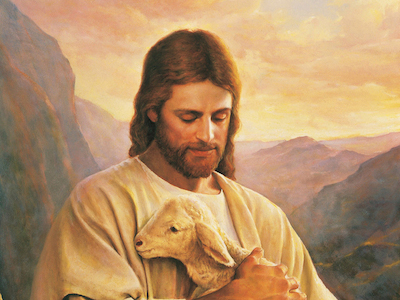 A ten-year-old boy named Kenny, an only child, was dying of an incurable disease. Month after month his mother cared for him, read to him, and played with him, all the while trying to keep from him the terrible truth. One day, however, he asked, “Mama, what’s it like to die? Does it hurt?” The mother hurried off to the kitchen, pretending she had to turn off something on the stove, but in actuality she didn’t want her son to see her break down and cry. She knew it was an important question and that she had to give an answer, so she prayed and asked for God’s guidance. She experienced a sense of the Lord’s presence, and an answer came to her. The mother went back to her son and said, “Kenny, remember how when you were little you used to play so hard all day that by night time you were too tired even to undress, and so you’d crawl on my bed and fall asleep? That wasn’t your bed, and because you didn’t belong there, you wouldn’t stay there long. To your surprise, you’d wake up in the morning and find yourself in your own bed, in your own room. You were there because someone who loved you had taken care of you. Your father had come with big strong arms and carried you away. Well, Kenny, dying is like that. We wake up one morning and find ourselves in our room in heaven. Jesus carries us in His arms and takes us where we belong.” The boy’s shining expression showed that he understood and was no longer afraid—and when he died peacefully a few weeks later, his parents knew he had been carried home by his heavenly Father (Illustrations Unlimited, p. 139).
A ten-year-old boy named Kenny, an only child, was dying of an incurable disease. Month after month his mother cared for him, read to him, and played with him, all the while trying to keep from him the terrible truth. One day, however, he asked, “Mama, what’s it like to die? Does it hurt?” The mother hurried off to the kitchen, pretending she had to turn off something on the stove, but in actuality she didn’t want her son to see her break down and cry. She knew it was an important question and that she had to give an answer, so she prayed and asked for God’s guidance. She experienced a sense of the Lord’s presence, and an answer came to her. The mother went back to her son and said, “Kenny, remember how when you were little you used to play so hard all day that by night time you were too tired even to undress, and so you’d crawl on my bed and fall asleep? That wasn’t your bed, and because you didn’t belong there, you wouldn’t stay there long. To your surprise, you’d wake up in the morning and find yourself in your own bed, in your own room. You were there because someone who loved you had taken care of you. Your father had come with big strong arms and carried you away. Well, Kenny, dying is like that. We wake up one morning and find ourselves in our room in heaven. Jesus carries us in His arms and takes us where we belong.” The boy’s shining expression showed that he understood and was no longer afraid—and when he died peacefully a few weeks later, his parents knew he had been carried home by his heavenly Father (Illustrations Unlimited, p. 139).
Jesus wants us to have this same sort of simple trust—on our own behalf, and on behalf of those we love. He is the One Who calls us home and helps us arrive where we truly belong. As humans, we’re naturally frightened of our own death, and grief-stricken by the death of our loved ones. Jesus reminds us, however, that death becomes life for those who have faith in Him.
Our God is a God of life, and death was never part of His plan, nor was it part of His creation—it came into existence because of human sinfulness. Even so, as the readings for the Fifth Sunday of Lent show, death cannot withstand the power of our heavenly Father. In the passage from the Book of the Prophet Ezekiel, God says, “O My people, I will open your graves and have you rise from them . . . thus you shall know that I am the Lord.” God was speaking of restoring the nation of Israel after a time of defeat and exile, but His prophecy was fulfilled in an even more important spiritual sense. As St. Paul tells us in the Letter to the Romans, if the Holy Spirit dwells in us, we will be raised up from physical death just as Jesus was raised from the dead on Easter Sunday. The miracle in today’s Gospel was designed to demonstrate the Lord’s power. Jesus restored Lazarus to life. This was not only an advance announcement or preview of His own coming resurrection, but also a sign that all who place their trust in Him will live eternally in heaven. As Jesus said to Martha, “I am the resurrection and the life; whoever believes in Me, even if he dies, will live forever.” Our Lord is inviting all of us to believe in His victory over death, so that we might share in it and live with Him forever.
Some children were once asked to describe or explain death, and they gave some interesting answers. Seven-year-old Alan said, “God doesn’t tell you when you are going to die because He wants it to be a surprise.” Eight-year-old Aaron stated, “The hospital is the place were people go on their way to heaven.” According to ten-year-old Raymond, “A good doctor can help you so you won’t die; a bad doctor sends you to heaven.” To this, nine-year-old Stephanie added, “Doctors help you so you won’t die—until you pay all their bills.” In the words of a nine-year-old girl named Marsha, “When you die, you don’t have to do homework in heaven—unless your teacher is there, too” (Swindoll’s Ultimate Book of Illustrations & Quotes, pp. 140-141). On another occasion, a boy wrote a letter to God which said, “Dear God, what is it like when you die? I’ve been wondering about it, but no one will tell me. Your friend, Mike. P. S. I just want to know; I don’t want to do it” (homily notebook, “Death”).
That’s the way it is with most of us: we wonder what death is like, but we’re in no hurry to acquire first-hand information. Even though it’s inevitable, our society doesn’t like to talk about death. Perhaps it’s because there are so many things we’ve been able to create and discover and achieve—but death will always remain beyond our control. 21st century America can do many amazing things, including things which would have seemed miraculous even 100 years ago, but it cannot change the fact that all of us will one day die. Society might not be able to look at this reality with hope, but the Church can—and does. Our faith is in Jesus—the One Who gives life and death true meaning; therefore, if we consciously unite our sufferings with His and offer Him our burdens and worries and fears, all these things can become valuable and worthwhile. Our faith is in Jesus—the One Who wept at the death of His friend Lazarus, and Who knows what it is to grieve. Therefore, if we offer Him our loneliness and sorrow and grief over the death of our loved ones, He will sympathize and understand and help us bear this burden. Our faith is in Jesus—the One Who died and was raised to new life. Therefore, if we place our hope in Him and live as He asks, He will help us overcome our fears and lead us into eternal peace.
The answers Jesus gives are not easy ones—but they are true. Life is meant to have meaning— and if we choose, this can also be true of death. The key is faith: simple, trusting, lived-out faith. If we believe in Jesus and remain in the spirit of His love, one day we will awaken to find that He has carried us to the home where we truly belong.








